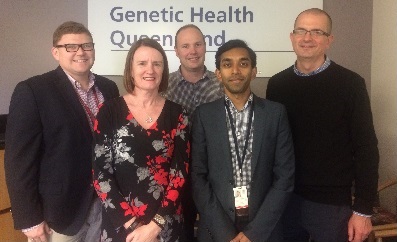Leading the way in renal genomics

Dr Andrew Mallett, Associate Professor Julie McGaughran, Dr Cas Simons, Dr Chirag Patel and Dr Peter Trnka are part of KidGen – the National Renal Genetics Flagship for AGHA.
Royal Brisbane and Women’s Hospital nephrologist Dr Andrew Mallett is leading a new National Rare Disease Flagship for Renal Genetics.
The Australian Genomics Health Alliance (AGHA), supported by a $25 million National Health and Medical Research Council grant, is driving nationwide integration and implementation of genomic medicine in healthcare.
The AGHA renal genetics flagship known as KidGen is one of five across Australia and the only one based in Queensland.
Dr Mallett, who is national director of KidGen and co-lead of the Queensland Renal Genetics Service based at RBWH, said the aim of the consortium was to improve the translation of genomics into healthcare and the understanding of inherited kidney disease.
“KidGen’s focus is on supporting and reimagining clinical care for families with inherited kidney disease using new tools, including genomics, and research,” Dr Mallett said.
“Genomics is the one technology that has the greatest opportunity to change healthcare for the better – in my generation. It has applications in all kinds of health areas including infectious diseases, cancer, rare disease, reproductive medicine, transplantation to name a few.
If we know the genetic causes of disease, inherited or otherwise, we have a starting point for clinical care, research and future treatment. We can’t begin to think about treating things we don’t understand.”
Kidney-related disease affects around one in eight Australian adults, with 10 to 20 per cent having an inheritable form of the disease.
KidGen brings together brings together paediatric and adult nephrologists, clinical geneticists, genetic counsellors, diagnostic genomics lab teams, research genomics teams and disease modelling research groups from across Australia.
“This collaborative approach allows us to integrate these new tools into healthcare to improve diagnosis, prognosis, treatment options and provide Australians with rare disease an accurate diagnosis in a faster timeframe.
It’s a one-stop shop to provide for genomic sequencing in a clinical capacity and, where appropriate, in a research capacity.
That genomic information can then be used to better tailor genetic counselling, investigations and treatments to a patient and family’s particular needs. This is the amazing potential that genomics unlocks in this age of precision and personalised medicine.”
